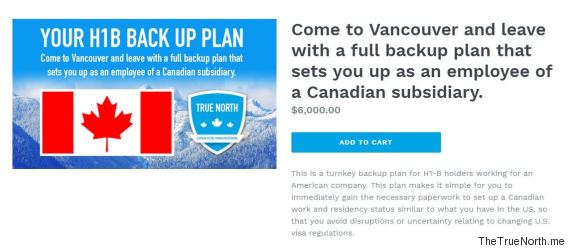The U.S. tech sector relies heavily on foreign-born talent, and after President Donald Trump signed an executive order that threatened the future of tech employees in that country, some companies are looking to Canada.
Trump's order bars refugees, as well as immigrants from Iraq, Iran, Syria, Somalia, Sudan, Libya, and Yemen — all Muslim-majority countries, from entering the U.S.
A Vancouver immigration lawyer told The Globe and Mail that on the weekend Trump signed the order, he met with a dozen clients, including engineers and PhD students, who were interested in moving to Canada.
And it's not just refugees or workers from those seven countries who might want to pack up shop.
Immigration rules up in the air
Currently, the U.S. allows 85,000 workers to cross its borders every year through H-1B visas, a lottery-based temporary foreign workers permit for employees with specialized skills.
Immigrants are a big part of the tech industry — companies including Tesla, Microsoft, Google, eBay, Yahoo and Apple were either founded by or are currently run by newcomers to the U.S.
This week, a draft of a proposed executive order to revamp the visa program was leaked from the White House. If approved, the order could revoke the right of current workers to remain in the U.S. or prevent more workers from entering the country.
All the unknowns are making Canada look like an attractive alternative.
Silicon Valley consultant and entrepreneur Scott Rafer launched a startup to help workers and companies struggling with that uncertainty.
Truth North offers a US$6,000 package to fly employees to Vancouver, where they can meet with immigration experts and hear about how to set up their current jobs under a Canadian subsidiary.
![true north]()
Rafer told Tech Crunch that they "aren’t saying to move on spec but to have a ripcord."
He explained that British Columbia has the infrastructure to be a major tech hub, and that is plan won't disadvantage Canadian-born workers.
“It’s not highly educated immigrants coming in and taking anything that’s even remotely considered a Canadian job,” Rafer told The Globe and Mail.
“It’s high-income foreigners coming in and bringing their job with them.”
It looks like the Canadian tech community is ready to welcome employees with open arms.
Since Sunday, over 3,000 members of Canada's tech community have signed an open letter calling on Ottawa to give temporary residence to anyone displaced by the ban (something Canada has since announced it will do).
"Canadian tech companies understand the power of inclusion and diversity of thought, and that talent and skill know no borders," the letter reads.
Canada recently introduced new visa measures that make it even easier for tech companies to recruit foreign talent.
"This utterly foolish action by the U.S. government is an opportunity 100 times greater to build Canada," startup co-founder Daniel Debow told Business Insider.
Follow The Huffington Post Canada on Facebook, Twitter, and Instagram.
Trump's order bars refugees, as well as immigrants from Iraq, Iran, Syria, Somalia, Sudan, Libya, and Yemen — all Muslim-majority countries, from entering the U.S.
A Vancouver immigration lawyer told The Globe and Mail that on the weekend Trump signed the order, he met with a dozen clients, including engineers and PhD students, who were interested in moving to Canada.
And it's not just refugees or workers from those seven countries who might want to pack up shop.
Immigration rules up in the air
Currently, the U.S. allows 85,000 workers to cross its borders every year through H-1B visas, a lottery-based temporary foreign workers permit for employees with specialized skills.
Immigrants are a big part of the tech industry — companies including Tesla, Microsoft, Google, eBay, Yahoo and Apple were either founded by or are currently run by newcomers to the U.S.
This week, a draft of a proposed executive order to revamp the visa program was leaked from the White House. If approved, the order could revoke the right of current workers to remain in the U.S. or prevent more workers from entering the country.
All the unknowns are making Canada look like an attractive alternative.
Silicon Valley consultant and entrepreneur Scott Rafer launched a startup to help workers and companies struggling with that uncertainty.
Truth North offers a US$6,000 package to fly employees to Vancouver, where they can meet with immigration experts and hear about how to set up their current jobs under a Canadian subsidiary.

Rafer told Tech Crunch that they "aren’t saying to move on spec but to have a ripcord."
He explained that British Columbia has the infrastructure to be a major tech hub, and that is plan won't disadvantage Canadian-born workers.
“It’s not highly educated immigrants coming in and taking anything that’s even remotely considered a Canadian job,” Rafer told The Globe and Mail.
“It’s high-income foreigners coming in and bringing their job with them.”
It looks like the Canadian tech community is ready to welcome employees with open arms.
Since Sunday, over 3,000 members of Canada's tech community have signed an open letter calling on Ottawa to give temporary residence to anyone displaced by the ban (something Canada has since announced it will do).
"Canadian tech companies understand the power of inclusion and diversity of thought, and that talent and skill know no borders," the letter reads.
"It’s high-income foreigners coming in and bringing their job with them."
Canada recently introduced new visa measures that make it even easier for tech companies to recruit foreign talent.
"This utterly foolish action by the U.S. government is an opportunity 100 times greater to build Canada," startup co-founder Daniel Debow told Business Insider.
Follow The Huffington Post Canada on Facebook, Twitter, and Instagram.
-- This feed and its contents are the property of The Huffington Post, and use is subject to our terms. It may be used for personal consumption, but may not be distributed on a website.